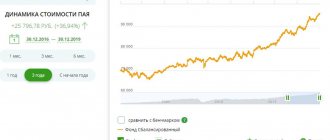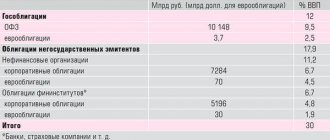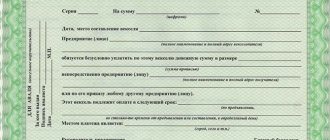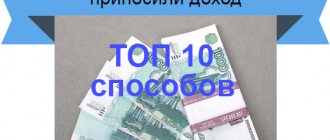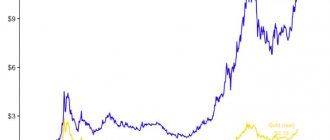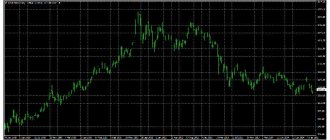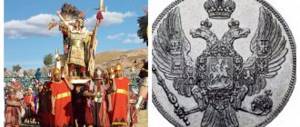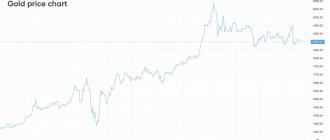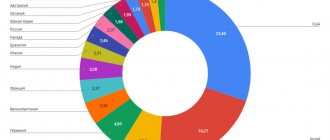Understanding that money should work and generate income forces you to look for the most profitable ways to invest it. Some people make deposits the old fashioned way. Others are more confident in investing in real estate or precious metals, often gold. An interesting financial instrument offered to private clients is the Sberbank - Gold mutual fund. Such investments give on average even higher returns than Sberbank deposits. Today I will tell you what kind of fund this is, how and under what conditions it works.
What are they and why are they needed?
The structure of the mutual fund is based on investors' investments - shares. Mutual Fund "Sberbank - Gold" can be compared to a large wallet into which thousands of people have put banknotes. The money doesn’t just sit there, but is invested in various financial instruments - stocks, bonds, valuables. In this case, the management company invests in the Western ETF fund SPDR Gold Trust. The purpose of a mutual fund is to generate income through the growth in the value of assets. From the formed portfolio, each participant receives a portion proportional to the invested funds.
Sberbank Mutual Fund is an affordable and simple way to invest in gold. Today, this is an opportunity to become a full-fledged participant in the stock market without experience or professional knowledge. To purchase a share, a small amount is required - from 1000 rubles.
The assets of shareholders are managed by a company that has received a license to conduct such activities. The size of the mutual fund's total income, and therefore the participant's profit, depends on the choice of shares and the quality of their management.
Other differences
Friend or foe
Finex is a foreign organization. Registered in Ireland.
The fund from VTB is Russian.
FXGB is an ETF. VTBG - BPIF (sometimes called Russian ETFs). At first glance there is not much difference. But investors need to know that the requirements for ETFs are more stringent. They are more regulated. This affects the quality of management (for the better).
With BPIF, everything is simpler (it’s not for nothing that Russian banks and other management companies issue BPIF, not ETFs). There are essentially no special complex requirements. Which is what they actually use. Without even bothering with self-tracking. Acting as a bridge between investors and foreign funds.
Investment conditions
| Manager | |
| Name | Open investment fund RFI "Sberbank - Gold" |
| Registration number | 22-000-1-00013 |
| Registration date | 04.10.2000 |
| Number of shareholders | 2090 |
| Ticker isin | RU000A0JTRF8 |
| An initial fee | In the office - 15,000 rubles, online - 1,000 rubles. |
| Subsequent payment | 1000 rub. |
| Minimum term | No, recommended - from 3 years |
| Risk | Average |
| Expected return | Since the beginning of the year - 12.8% |
| Commission | When purchasing a share:
Upon redemption:
The management company's remuneration is 2%. |
Types and examples of “gold” ETFs
Some ETFs invest in physical gold bullion, while others invest in futures contracts for the precious metal. The first funds track spot gold prices and copy them exactly. Secondly, the value of the fund may differ significantly from fluctuations in “gold” quotes.
Here are the three largest ETFs that invest in gold bullion:
SPDR Gold Shares ETF (GLD)
The largest “gold” ETF, founded at the end of 2004. HSBC Bank USA was appointed responsible for the safety of the gold bars of this fund.
Almost all SPDR Gold Shares gold is stored in the bank's vault in London (stock audits are carried out three times a year). Every day the fund updates its gold bullion sheet and each investor can see the movement "out" and "in" of the ETF.
GLD chart courtesy of TradingView
The management fee for GLD shares is 0.40%.
iShares COMEX Gold Trust (IAU)
This “gold” ETF was founded a little later – in January 2005. IAU units are backed by physical gold in vaults in London, Toronto and New York. JP Morgan Chase Bank has been appointed as the responsible custodian. The hallmark of ETF Gold Trust gold bars meets the standards of the London Bullion Market Association and the COMEX exchange.
IAU chart courtesy of TradingView
Like its predecessor fund, the iShares COMEX Gold Trust does not hold derivatives or cash in its assets. For the investor, the management fee is 0.25%.
ETFS Physical Swiss Gold Shares (SGOL)
SGOL is a relatively young fund, created in September 2009. The shares of this ETF are backed by gold, which is stored in Switzerland. JP Morgan Chase was chosen as the bank responsible for custody. The management fee here is 0.39%.
SGOL chart courtesy of TradingView
Advantages and disadvantages of mutual funds
The main advantage of investing in funds managed by Sberbank is a partnership with a reliable, stable financial institution. Among the advantages of trust management of the Security Council of the Russian Federation, I will highlight the following:
- professional asset management with thorough market analysis;
- legality, transparency of activities;
- sharing risks by investing in several financial instruments;
- simple registration procedure;
- available participation amount;
- high degree of liquidity;
- an extensive network of Sberbank branches;
- conducting transactions online.
The disadvantages of mutual investment include the lack of guarantees of profit from the manager and the state. Investments in gold may turn out to be unprofitable if the price decreases. Risks are borne by the participants. The management company charges a commission when buying/selling a share and receives an annual remuneration. But the main drawback is double commissions, because... all the mutual fund does is collect money and simply transfer it to the Western GLD fund.
Discovery - Gold
Limited Liability Company "Manager. License No. 21-000-1-00048 dated April 11, 2001 to carry out activities related to the management of investment funds, mutual funds and non-state pension funds, issued by the Federal Commission for the Securities Market of Russia, without limitation of validity. License of a professional participant in the securities market No. 045-07524-001000 dated March 23, 2004 to carry out securities management activities, issued by the Federal Securities Commission of Russia, without limitation of validity.
You can obtain detailed information about trust management, including services for individual trust management, at the address: Russian Federation, 115114, Moscow, Kozhevnicheskaya street, building 14, building 5, on the Internet at: , as well as from agents with a list of which can be found on the website.
You can obtain detailed information about mutual investment funds and familiarize yourself with the rules of trust management of mutual investment funds, as well as other documents, at the address: Russian Federation, 115114, Moscow, Kozhevnicheskaya street, building 14, building 5, on the Internet at: , a also from agents who accept applications for the acquisition, exchange and redemption of investment units of funds at the places where applications for the acquisition, exchange and redemption of investment units are accepted, a list of which can be found on the Internet at: .
Before purchasing an investment share, you should carefully read the rules of trust management of a mutual investment fund. The value of investment shares may increase and decrease, past investment results do not determine future income, and the state does not guarantee the return on investments in mutual funds. Charging premiums (discounts) will reduce the return on investment in investment units of a mutual fund. The performance of the securities manager in the past does not determine the future income of the management founder.
The rules for trust management of the open mutual fund of market financial instruments “Otkritie - Shares” were registered by the Federal Commission for the Securities Market of Russia on December 17, 2003 No. 0164-70287842; The rules for trust management of the open mutual fund of market financial instruments “Otkritie - Bonds” were registered by the Federal Commission for the Securities Market of Russia on December 17, 2003 No. 0165-70287767; The rules for trust management of the open mutual fund of market financial instruments “Otkritie - Innovation Leaders” were registered by the Federal Financial Markets Service of Russia on April 16, 2013 No. 2586; The rules of trust management of the open mutual fund of market financial instruments “Otkritie - Eurobonds” were registered by the Federal Financial Markets Service of Russia on December 8, 2011 No. 2275; The rules of trust management of the open mutual fund of market financial instruments "Otkritie - Gold" were registered by the Federal Financial Markets Service of Russia on December 8, 2011 No. 2277; The rules for trust management of the open mutual fund of market financial instruments “Otkritie - Global Investments” were registered by the Bank of Russia on October 29, 2015 No. 3059; The rules for trust management of the Otkritie - All-Weather BPIF of market financial instruments were registered by the Bank of Russia on August 27, 2020 No. 4147; The rules for trust management of the open-end mutual fund of market financial instruments “Otkritie - Balanced” were registered by the Bank of Russia on December 24, 2020 No. 4243.
*When the disclosed information is published on the website, access to such information is unlimited.
Dear Customer! Please note that clients are required to provide organizations carrying out transactions with funds or other property with the information necessary for these organizations to fulfill the requirements of the Federal Law of 07.08.2001 N 115-FZ “On combating the legalization (laundering) of proceeds from crime, and terrorist financing,” including information about its beneficiaries and beneficial owners. We ask you to promptly update the information provided by Otkrytie Management LLC when concluding trust management agreements and purchasing units of mutual investment funds.
The information posted on the site is for informational purposes only; the information presented therein does not constitute an individual investment recommendation, guarantee and/or promise of performance (return on investment) in the future. Otkritie Management Company is not responsible for the use of information contained in publications, as well as for possible losses from any transactions with assets made on the basis of data contained in publications.
How to buy and sell: step-by-step instructions
Purchasing a share in Sberbank - Gold consists of the following steps:
- Submitting an application to an agent at the office of the Management Company, an authorized branch of Sberbank, or in your personal account on the website https://my.sberbank-am.ru/webmvc/login/login (simple preliminary online registration is required). There you can download the Sberbank Asset Management application to your phone or laptop. The addresses of the sales offices of the mutual fund “Sberbank - Gold” can be found on the page https://www.sberbank-am.ru/offices/, indicating the desired city and the product you are interested in for the search. The central sales office is located in Moscow, on Presnenskaya embankment, 10.
- To fill out the form, prepare your passport and your bank account details in advance. If you do not have a current account, first visit any convenient branch to open one.
- Transfer of money for the purchased share, taking into account the commission.
- Within 3 days, the buyer's information is entered into the register. The shareholder receives an extract from it. From now on, you are a shareholder of the Sberbank fund and are waiting for the price of the share to rise in order to redeem it profitably.
To redeem a share of the mutual fund "Sberbank - Gold", an application is submitted, which must be satisfied within 3 days. The fund is given up to 10 working days to transfer funds to the investor’s account. The redemption of the share is carried out minus the commission.
What's happening to gold in 2016?
Firstly, according to the results of the first four months of 2016, gold became one of the most highly profitable assets (the increase in value was more than 20%). Dan Denbow, co-manager of the USAA Precious Metals & Minerals Fund, even called gold "the biggest sensation of the year."
Secondly, the volume of gold in index funds is growing at the fastest pace since 2009 (the crisis year).
Since about this February-March, asset managers have been persistently advising their clients to include gold in their investment portfolios. Now the precious metal is a good insurance policy in case of a serious stock market crash and “misunderstandings” with the euro and dollar.
Note that the price of gold does not correlate with the stock or bond market and is negatively correlated with the dollar exchange rate. That is why this asset should be in absolutely every portfolio! Today, the weight of precious metals in an investor’s portfolio should be at least 8-10%.
Alternatives
Experts advise diversifying risks and not using only one instrument to generate income. In addition to mutual funds, gold investments in Sberbank are available in the following options:
- physical gold;
- metal bills;
- ETF.
Compulsory medical insurance
Metal accounts are opened at a Sberbank branch. Non-cash gold is purchased at the rate set by the financial institution and deposited into the account. The income of such an investment depends on the growth of gold prices. The greater the difference in exchange rate when selling gold from an account, the greater the profit. As a rule, it takes more than one year to receive income. Gold on compulsory medical insurance is an investment in the long term.
When buying gold on an account, the buyer does not need to worry about the storage conditions of the bullion.
Expert opinion
Lyudmila Pestereva
Our most experienced gold investor
Ask a Question
The disadvantage of compulsory medical insurance is that the funds in such an account are not considered a deposit. This means that state insurance does not cover them.
ETF (FinEx or GLD)
Exchange-traded funds are also dealt with through management or brokerage companies. ETFs trade on the stock exchange, investing in stocks, bonds, sometimes physical gold, and futures. ETF fees for fund management are lower than those of mutual funds - up to 1%.
Only qualified investors can buy ETF shares on foreign markets. An alternative on the local market is the FinEx Gold ETF. It conducts operations on the Moscow Exchange and is available to a wide range of investors.
Share price
The creators of VTBG probably knew that in terms of management costs, they were losing to their competitor. Accordingly, even without advertising double expenses, most investors will see (know) where it is cheaper. And in this regard, of course, real VTBG commissions are not the fund’s strong feature.
The guys decided to take others. We made the cost of one share on the stock exchange 1 ruble. For comparison, FXGD shares are currently trading at 820 rubles.
Many will take, although expensive in terms of expenses, but cheap in price , a fund from VTB “for change”.
“There are a couple of hundred (or even a couple of tens) rubles left in the account. You can't take anything with this money. Oh, no. Well, there is a penny-ruble gold fund VTBG. Beauty!"
Coveted golden ounces
The price of gold today fluctuates around the maximum levels of 2012 ($1,770 per ounce). A growing gold trend emerged at the end of 2021. The price of gold has increased by 18% since then. Securities, indices and other assets show more modest dynamics. Other precious metals either decreased in price, as platinum did, or retained their January positions (platinum and silver). But this is not yet a reason to think that the rise of the gold market will continue steadily. So far, it has been the result of the March collapse of world stock markets.
Investments in gold funds became more active by the beginning of July. According to the latest reports, they already amount to about $2 billion weekly. Domestic gold funds are not yet so popular, but investors are becoming more and more interested in them. Moreover, these structures are leading today in the growing price of shares.
The volume of net assets of gold funds in the sector of open mutual funds is currently no more than 7 billion rubles (approximately 1.5% of the market). But investments since January have already reached 2.3 billion, which is 3% of the total market capital inflow.
Such investment funds deal either with gold alone or with other precious metals. If a client is offered an investment scheme in several metal assets simultaneously, it will be difficult to understand and intuition. But there must be a choice. Therefore, banking structures such as Raiffeisen or Sberbank create separate funds for each precious metal.
Liquidity - give me my money
Or a quick sale. How quickly can you drop an asset and get your money?
Metal bills - we sell through your personal account. The money is immediately ready for use. Liquidity is instant.
ETF - only on business days. During the trading hours. Market makers and other trading participants provide constant liquidity. And the sale itself is a matter of 1 second.
But the money, according to the T+2 trading rules, will be available only 2 days from the date of the transaction. Plus, if you need to withdraw from a brokerage account - from a few hours to 1-2 days.
Again, only working days are taken into account. Although in fact, in most cases, funds are withdrawn on the same day. Sometimes the next one (if the withdrawal request was late in the evening).
Mutual funds - up to several business days. As far as I remember (but I could be wrong), the maximum period for issuing money from the sale of shares is up to 14 days. Usually funds are processed in 3-4 days. Plus or minus 1-2 days. Both up and down.
Why investing in gold is attractive now
The currencies of leading economies have not been fully backed by gold for a long time. Moreover, the world's leading economies are supported by easing programs: in fact, the amount of unsecured money supply is increasing. Gold appears to be one of the few ways to protect against currency risk.
Trade wars, sanctions, conflicts, epidemics and their consequences create the need for protective assets. And the most famous of them is traditionally considered gold. From the beginning of 2021 to July 2021, its exchange price increased by 37%. And continues to remain in an upward trend, reaching the highs of 2011. By the way, they were also once a consequence of post-crisis foreign exchange interventions by financial regulators.
You can use gold as a protective asset in various ways:
- Buy physical gold in coins, jewelry or bars;
- Buy futures contracts on the exchange;
- Invest in shares of gold producers;
- Open a metal bank account (OMS);
- Buy gold ETFs or shares of gold producers.
Drawing conclusions
Mutual funds - which have the largest annual commission, can be considered only for short periods - up to 3 years. During this period, the difference from “eating up” a share of your capital with annual commissions will not be so noticeable. And then, only if there are no one-time commissions for buying and selling shares.
And it is possible to use them collectively in one family of funds to transfer funds from mutual fund to mutual fund (exchange of shares) without paying taxes.
In other cases, it is probably not profitable to use mutual funds. The commissions are too high.
Anonymized metal accounts, despite the highest one-time commissions, throughout the entire period after purchase, will not ask you for a single penny from above. Until the moment when you need to sell (hopefully with a VERY GOOD profit).
Well, you will pay 3% on top of the purchase. For a period of 10 years it is only 0.3%.
Plus, the property deduction benefits offset the spread paid.
Can be considered for long periods - 8-10 years and above.
If you take short ones (up to 3 years), then you need to count on the growth of gold during this period. If there is no growth, you will get caught in the spread and you will be in the red. There is growth, we will receive the profit in full (using a property deduction) - without paying taxes. Tax savings will make it possible to partially or fully offset the bank's spread costs.
Buying ETFs on your own turned out to be the most profitable in most respects. And it is designed for both long-term and short-term investments. To the point of speculation.

